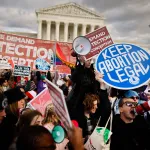As abortion bans with narrow restrictions go into effect across the country, local and state judges — who typically lack medical training and are predominantly White men — are playing an increasingly significant role in determining whether someone is able to access an abortion.
Judges have long been influential in deciding whether minors are able to get abortions through a mechanism known as judicial bypass. In the majority of states, minors have for years only been able to get an abortion if they obtain parental consent first. Those who are unable to do so can petition a judge to override the requirement.
The judicial bypass system has been criticized by many physicians and abortion rights supporters, who note that getting a hearing can take weeks, affecting what options are available to petitioners. Decisions can be largely shaped by the personal and political inclinations of individual judges. State and local judges are selected separately from those who serve on the federal judiciary. In some states, judges are elected. In others, they are political appointees selected by the governor.
In one case from this past January, a Florida judge denied a 17-year-old girl her judicial bypass in part because of her GPA. (An appeals court overturned that decision, and the judge recently lost a reelection campaign.) Earlier this month, a 16-year-old was denied because of questions about her “maturity.”
“The personality of the judge, and his training and his social economic status is all very important,” said Carol Sanger, a professor at Columbia School of Law who has studied the judicial bypass process.
The bevy of new abortion restrictions has expanded the impact the judicial bypass requirement can have. Roe’s overturn has allowed more states to enact abortion bans earlier in pregnancy. Three states — Georgia, South Carolina and Ohio — are now enforcing six-week abortion bans, and Florida is enforcing a 15-week ban.
-
More abortion coverage
- What abortion looks like in every state — right now
- Republican midterm candidates are trying to rewrite their history on abortion. Here’s what that means.
- ‘I would wish this on absolutely no one’: How three women dealt with pregnancy in the year since Texas’ six-week abortion ban
That means that the process of appealing a bypass ruling — which can take weeks in some cases — puts young people up against a truncated timeline, Sanger said. For instance, she noted, Florida’s truncated deadline could mean the process of appealing could simply take too long, so even if it successful, it could be too late.
“All sorts of personal preference and beliefs contribute to how a judge decides these cases,” Sanger said. “The hearings now act as a kind of scolding, and they’re humiliating. You’re asked about, ‘Were you and your boyfriend using birth control?’ or ‘What‘s the matter with your parents that you can’t tell them?’”
In states that ban abortions after six weeks of pregnancy, the time required to get a judicial bypass often puts abortions out of reach. Most people do not realize they are pregnant until the fourth week of pregnancy at the absolute earliest.
Texas started to enforce a six-week cutoff for abortions last September. Once that law took effect, the vast majority of minors who could not obtain parental consent were unable to get an abortion in the state, said Irma Garcia, client services manager for Jane’s Due Process, which helps young people get abortions. And without the support of their parents, many were also unable to travel out of state for a procedure.
“Any delay to reaching a decision on cases where the law is in effect has tremendous consequences for people accessing abortion,” said Brigitte Amiri, deputy director at the ACLU’s Reproductive Freedom Project.
Beyond judicial bypass cases, many abortion bans across the country include thin, vaguely defined exceptions that allow for abortion to be provided if continuing a pregnancy would jeopardize the life, or sometimes the health, of the pregnant person.
Eleven states are now enforcing almost total abortion bans, in addition to the three with six-week bans. All of these bans have nominal exceptions if the abortion would save the pregnant person’s life — but the legislative language is often unclear, and likely to be tested in state court, another area where judges hold influence.
It’s also unclear to doctors and other abortion providers what constitutes this kind of medical emergency, and under what circumstances physicians or other abortion providers could be held liable for providing an abortion.
“What if I break the law but save my patient?” a West Virginia physician recently told The 19th, as the state debated its own abortion ban, which has not been passed but was written similarly to many laws now being enforced. “And what if I don’t break the law and my patient dies? If I save my patient do I lose my medical license? And do I go to prison?” (The physician’s name is being withheld because abortion providers who work at his clinic have been threatened with violence.)
There is no medical term that determines something “an emergency.” And many physicians are worried that merely knowing that someone’s condition could worsen without an abortion may not be enough to qualify for an exception.
For instance, patients experiencing ectopic pregnancies — a life-threatening situation in which a fertilized egg is stuck outside the uterus — require abortions, per an amicus brief filed by a group of medical organizations in a federal case challenging components of Idaho’s abortion ban. But waiting for a true “emergency” could mean delaying care until the patient is at severe risk of internal bleeding and requires emergency surgery, increasing the chance of death.
How laws are enforced and interpreted — and which cases are considered truly life-threatening — will vary from county to county, legal experts noted. And they will be based in large part on how local prosecutors and judges enforce them.
“The fact of the matter is these doctors don’t know what the judges are going to do with these laws once they get before them. They don’t know what Judge X or Y will say,” said Molly Meegan, chief legal officer and general counsel for the American College of Obstetricians and Gynecologists.
That uncertainty can in some cases deter health care professionals from providing abortions they might, under their own interpretation of the law, feel legally secure doing. It is often harder to know in advance how a particular judge might lean, and judges are often assigned through a random process. In some states, the penalty for performing an illegal abortion can be lifetime imprisonment, or fines of up to $100,000.
“No doctor wants to be dragged through court and a potentially expensive, reputation-damaging experience, even if the ultimate result is safe,” said Greer Donley, an assistant professor at the University of Pittsburgh, who focuses on abortion policy. “This is where you have aggressive prosecutors capable, just by the threat, of chilling conduct — and aggressive judges, too.”







